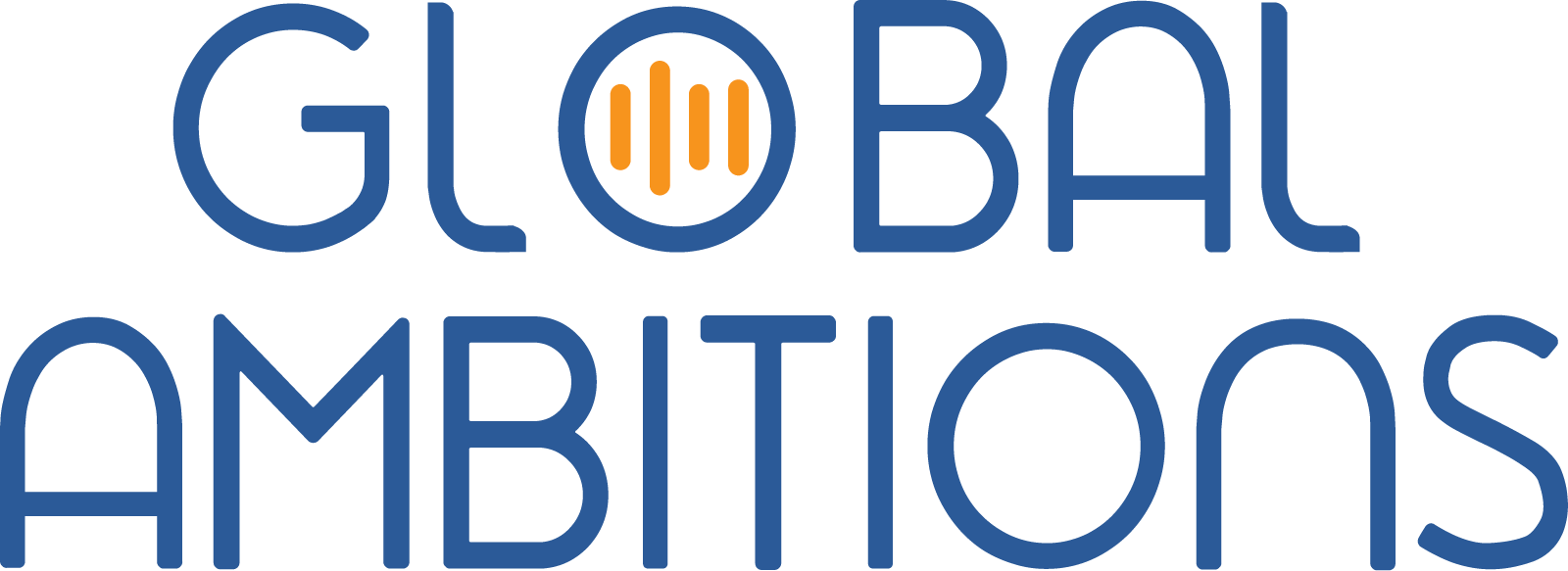With Eva Gross, Localization Consultant for Startups and Coach for Immigrant Women in Tech
Below is a full transcript of this episode
Antoine Rey
Hi, I’m Antoine Rey, and I will be your host today for this Global Ambitions podcast episode. And today my guest is Eva Gross. And Eva is a seasoned localization professional, and she has experience founding and scaling localization programs at startups such as Bold and Stripe. And she’s currently working as a localization consultant for a startup and as a professional coach for immigrant women in tech. Eva, welcome to the program.
Eva Gross
Thank you so much for having me, Antoine.
Antoine Rey
Okay, so the first question, straight into it, that we wanted to address is that you’ve recently made an interesting switch in your life. Moving from a corporate life to a consulting gig. How did that come about? And can you talk to us a little bit about this? Because I’m sure, a lot of our listeners may have contemplated a similar move.
Eva Gross
Absolutely, Antoine. Yes. So I know it’s not ladylike to reveal your age, but I’m going to for this answer. So I did turn 40 last December and had one of those moments where it was like, okay, what do I want to do with the rest of my life? I really thought, okay, thinking ahead, imagine you’re lying on your deathbed, you know, when you are, I don’t know, 90, or something like that. And you think back on your life, you know, what did I do with my life? What did I accomplish? What was important to me? So I really gave that some thought. I think big milestone birthdays can really have that effect. And so I thought to myself, you know, I’d love to help other people.
Part of what I’m doing now is coaching immigrant women in tech and having the flexibility to start a small business to do that sort of thing. A full-time job is a little bit tough to do at the same time. So I really thought, you know what, I’d love to be on my own, have my own business, do what I do best, which is consulting for localization at startups, and then also get into coaching immigrant women. Because that is really what I’ve built a lot of passion around over the last few years. So that’s the short answer, you know, and I think that’s just one of those things that’s a step that a lot of people take at some point in their careers. You know, it’s only been six months since I did it. I don’t know if it’s going to be forever, but so far so good.
Antoine Rey
But there’s also, I presume, some experience that you’ve built over the years with different companies that lead you to think, okay, I’ve got some interesting knowledge that I can share with other people and a drive as well towards coaching and teaching, I guess.
Eva Gross
Yeah, I think so. I think it’s very natural for those of us in this country who were immigrants. I’m originally from Germany. I moved to the States when I was 16. A lot of people helped me along the way. You know, I’ve had a lot of mentors, especially in the localization industry. I think we’re such a cool, tight-knit community that helps each other out. I felt a strong need to give back.
I know that sounds a bit cliche, but I’ve really felt that the happiest moments in my job the last few years, honestly, were when I was able to help other immigrants at work. So I really felt like, wow, you know, it’s a direct feedback mechanism. You can see someone light up. They finally are like, Oh, that’s what I can do. It’s really rewarding. So, yes, it’s been lovely to be able to help some more junior team members, some more junior coworkers, and I’d love to do more of it.
Antoine Rey
And I’m sure it’s in everybody’s back of their mind with the current layoffs that have been happening in the tech world. Right, left, and center. And I’m not sure we’ve had the end of it yet, but it can be probably a tricky time to do something like this and quit a job where you have a regular income to jump into consulting. And at the same time, it could be the best time to actually do it because of what’s happening. I guess time will say. But what do you think?
Eva Gross
Yeah, you know, it was pretty funny, I think just a week after I left Stripe in May, they said, well, we’re not going to hire as much anymore. I was hearing from my teammates. So it really started to happen right as I was leaving. So it wasn’t planned, obviously, that this would coincide. I think it can go two ways. There are definitely days, I have to be honest with you, where I wonder, is this the right time to be doing this? Is it, you know, is it or is it the time to kind of be safe, secure in a full-time job where you have one and just kind of stay in it and weather the storm?
On the other hand, what we’ve seen in past economic downturns is a lot of people starting new companies. So I think the 2008-2009 recession, I think Airbnb was started during that time or maybe slightly later. So there are a few companies. Great things have come out of these times. So, you know, I think that people get creative during times of economic downturn. It’s a time to be creative. I think a lot of times also when a company can’t get a headcount, maybe they can still hire consultants to do the work. So I really think it could go both ways and I really hope it goes the latter way. But we will see.
Antoine Rey
Yeah. Of course. Well, tell us a little bit about consulting for startups because this is what you’re doing, and I’d love to hear a bit more about that, please.
Eva Gross
So, you know, I really have gotten most business from word of mouth, a lot of folks that left Stripe also, you know, either join a startup or start their own startup. People remember me saying, oh, Eva, she started localization at Stripe. I worked with her for years.
And just like any other company, a lot of people think it must be easy. Let me just try this on my own. And sometimes they realize, Oh , you know what? This localization thing, it’s a little trickier than I suspected. And so that’s oftentimes when I get the slack ping or the email saying, Hey, would you have time for a chat? That’s really what it is.
One client I got just from posting on LinkedIn, I made a post when I left Stripe saying, you know, I’m looking to go into consulting for startups. And so, you know, folks really reached out a bit after that too. Actually, on a lot of topics. Some people reach out for mentorship after I posted some for consulting. So I think if I ever doubted the power of LinkedIn, I definitely saw it from that post after I left.
Another thing is, you know, localization world, LocWorld. So you just make connections, network, talk to people, and you hear something. There are just a lot of opportunities if you keep your eyes open and if you network.
Antoine Rey
What services do you bring to those startups, and at what stage do you think they might need your services?
Eva Gross
It’s really varied. I just did a Q&A session for a client that just had questions on like, how do you set up and run a program for localization? How do you deal with proper handoffs and workflows? So really, it’s been fun because everything has been so different. I’ve had another client I recently talked to about how you detect user language, and things like that. How do you do legal localization, what’s the best workflow? So it’s really just been all different things.
Ideally, what I’d like to do, this hasn’t happened quite yet because I’m just at the beginning of this journey. After having taken summer off and gotten started in earnest, probably in September or so, would be to really come in and look at where they’re at and see where they want to go and then make a proposal and then help them implement that proposal. I think that’s an ideal world scenario for scrappy startups. That’s usually not the case is what I’ve seen.
A lot of times. They’re kind of scrambling, figuring it out as they go. And they might say, okay, well, we’re going just to do this one project and see how it goes. They will ask you questions along the way. At some point, what I’ve seen is that the pain point gets so strong that they would need me more part-time, full-time, or hire somebody.
So to me, usually, a lot of localization has to do with pain points. What are the pain points for the startups? What do they feel they can solve themselves versus what you can do? So the services I offer really are anything from how do you set up a localization program from scratch? How do you set up workflows, and best practices across a program? What vendors could you or should you work with? How do you run an RFI RFP? What tools do you need? What TMS do you implement? What would work well with your developers? The basics of it.
And I’m not an engineer. I can talk about best practices. I can refer other consultants who are experts at this. So any of these things from beginning to end, that’s really where I feel most comfortable. So building something from scratch and scaling up to the next level.
In terms of when companies do this, you asked me about this, and I’ve seen it at all different stages. I’ve talked to somebody who was pre-series A or was Series A who had nothing except one page that just said welcome and it said it in English and Spanish, and they had nothing else yet that I saw.
So it’s just sometimes people think about it early, early, early on. And then other times I’ve seen people have entire successful English language product releases, and all of a sudden, they’re like, wow, there is a huge untapped revenue potential in the markets that we’re completely ignoring. How do we get there? I know in one of your webinars, which I love, you talked about it being kind of between Series B and C or C. I’ve seen that as well. But at the same time, I’ve also seen a big variety.
It’s just when does the problem become too big to ignore? And a lot of what I do is I don’t like to think of localization as a problem to solve. Localization is a revenue driver, not a problem to solve. It’s a revenue enabler. As Nataly Kelly so beautifully says, helping to change the thinking around that with startups can go a long way to changing to thinking. Oh, this problem, this project we have to do. No, no, no. How is this a yearlong company-wide ongoing initiative that will help us get to the next stage?
So a lot of what I try to do during my work with startups is really getting their mindset to change around them. Right? And it’s like really everything from setting up the operational side from scratch, as you mentioned, as well as positioning localization as a strategic function within the organization.
Antoine Rey
Something I love talking about myself, and with the background that you have with Apple, Bold, and Stripe, I presume you have a lot of experience in this. What have you seen like with your clients in consulting or previously some of the common mistakes or challenges and successes that those companies are going through at the startup level?
Eva Gross
I can’t speak too much for Apple. I was there long, long, long after it was a startup. But what I can say about the startup level, what I’ve seen is that almost everybody starts out trying to do this on their own without hiring a localization professional, and most people might not even know the word localization or what it means, or they might think it means something completely different when they start out. There’s a big learning curve.
In the beginning, you know, people might just say translation or something like that. So that’s one of the things is almost everybody starts out with a kind of subpar team or outset, and then they realize eventually that it’s really efficient to hire somebody who’s an expert at this. So that’s something that I’ve seen a lot.
I’ve also seen another common mistake is hiring not your uncle’s friend who speaks Spanish, which is kind of the joke, but they do hire a really small translation agency, you know, that can’t scale with them. It’s what I would say that I see quite a bit. They don’t think of many languages either. They say, okay, we’re going to start with just Spanish or just French, so let’s hire an agency that’s just that language. Okay, well, great. Now you’re successful in that language. Now what? You want to ask me more? Now you have to add another vendor. So sometimes not having the long view, I would say early on, people kind of think about just quick wins, not necessarily the long view.
And then the third common mistake, I would say, is just not thinking about internationalization, probably not even knowing what internationalization is, quite frankly, you know, not doing internationalization early on, ideally before you do any localization, of course. So that is probably honestly the biggest point. That’s the hardest to fix.
Antoine Rey
Out of everything said, I think. It seems to me there are a lot of people, and a lot of organizations reacting to a situation or to a market as opposed to planning from day one to go international, which surprises me. But is that what you’re seeing as well?
Eva Gross
Yeah, I think so. I think everybody starts low on the localization maturity model, like you said, reactive, if not negligent, which is the one step below.
Antoine Rey
Right.
Eva Gross
So I would say yeah, typically only when they get pressure from their own customer saying, hey, when are you going to be available in French or Spanish? So you’re absolutely right. I think it’s usually reactive. It’s very rare that someone comes in and says, you know, we haven’t localized into any language yet. Let’s make a plan. It’s very rare. So you’re absolutely right about that.
Antoine Rey
And so consulting is one side of what you’re doing, but you’re also venturing into coaching a certain number of people, right?
Eva Gross
Yeah, absolutely. So this has been the other thing I’ve been really excited about. So what I’m really focusing on, I went to a coaching certification program, and one thing they told me is to pick a niche. So I thought about this and said, What do I know best? What do I feel passionate about? And so my focus, my niche is really about coaching immigrant women in tech, which is myself.
I’m an immigrant woman, and so that’s what I know best, what I relate to, the best. I can coach other things, other people, and other circumstances, but that’s kind of what I’m currently focusing on. So I see that immigrant women in tech all kind of have something in common. We have high expectations in ourselves. Parents typically have high expectations of us. We have expectations in the tech industry and American society. There’s the American dream. To some extent, a lot of perfectionism, a lot of imposter syndrome, all that kind of stuff is what I see.
So I’m really hoping to help people build confidence to be able to confidently negotiate their salary, to manage up all those kinds of things that are more difficult for immigrants. They’re already difficult for women in general and for people in general. But once you add the layer of being a woman and another layer of being an immigrant, you have to overcome even more. I just think that immigrants have so much to offer, so much potential. We’re so adaptable. We’re usually bicultural and bilingual or multilingual. So we just have so much to offer.
And we sometimes don’t recognize our own worth. And we’re often taught to be humble as Europeans. I know I can say in interviews, we probably don’t brag as much as some Americans do because it’s not in our nature. We’re not taught to do that. And so I try and teach people and say, look, it’s just an act. You just really try to do this for this interview. I know you might be uncomfortable, but that 30 minutes or 45-minute interview could change the rest of your life. So I really try to help them get to the next stage with that and feel quite passionate about that. I’m currently working on the website, so stay tuned for sometime early next year that will be available. But yes, if anybody is interested in a free introduction session, please feel free to message me on LinkedIn. But yes, very excited about the coaching.
Antoine Rey
We’ll make sure to share your contact details on the podcast there and the industry, whether it is on the consulting side of the coaching side, is very lucky to have you, and certainly, I would recommend anyone who’s listening to go and check out what Eva is doing, and I’m sure it’s going to be a positive experience for everyone that engages with her. Thanks very much for joining Global Ambitions, Eva, and we look forward to talking to you again very soon.
Eva Gross
Thank you so much, Antoine, for having me.

Eva Gross
Localization Consultant for Startups & Coach for Immigrant Women in Tech
Email: evagrossconsulting@gmail.com
LinkedIn: https://www.linkedin.com/in/evagross/




